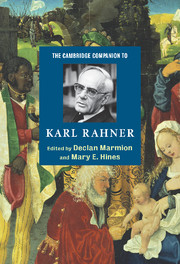Book contents
- Frontmatter
- Introduction
- Part I Spiritual, Philosophical, and Theological Roots
- Part II Theological Investigations
- Part III Conversations Ongoing
- 12 Rahner amid modernity and post-modernity
- 13 Rahner’s reception in twentieth century Protestant theology
- 14 Karl Rahner
- 15 Rahner and religious diversity
- 16 Political and liberation theologies
- 17 Feminist theologies
- Part IV Retrospect and Prospect
- Appendix
- Index
15 - Rahner and religious diversity
from Part III - Conversations Ongoing
Published online by Cambridge University Press: 28 May 2006
- Frontmatter
- Introduction
- Part I Spiritual, Philosophical, and Theological Roots
- Part II Theological Investigations
- Part III Conversations Ongoing
- 12 Rahner amid modernity and post-modernity
- 13 Rahner’s reception in twentieth century Protestant theology
- 14 Karl Rahner
- 15 Rahner and religious diversity
- 16 Political and liberation theologies
- 17 Feminist theologies
- Part IV Retrospect and Prospect
- Appendix
- Index
Summary
It is hard to name a theologian who has singularly influenced the contemporary discourse on religious pluralism more than Karl Rahner. In the 1960s and 1970s his writings on the topic gained wide appeal and his thoughts enjoyed popular exposure through public sermons and radio addresses. Throughout the last quarter of the twentieth century and into the new millennium, his theological project has so influenced the discussion that many of today's major voices on religious diversity present their theologies in direct conversation with his. Rahner's ideas have even elicited responses from notable spokespersons of the religions of the world. Thus, in examining Rahner's theology of religious pluralism, we can gain insight not only into his own influential thinking, but into the contours of the conversation today.
At the forefront of Rahner’s work was a concern that theology speak to people. And so, he explained Christian doctrine in a way that connected with lived experience. As people embedded in a complex and diverse world, Rahner recognized that the encounter with the religious “other” would be among the challenges Christians would face. Religious diversity was not merely an abstract theological concern, but one that grew out of an increasing awareness of and engagement with people of other faiths.
- Type
- Chapter
- Information
- The Cambridge Companion to Karl Rahner , pp. 235 - 248Publisher: Cambridge University PressPrint publication year: 2005
- 2
- Cited by



